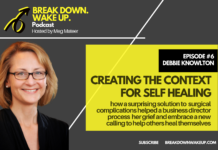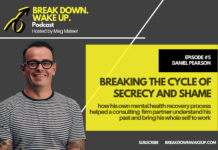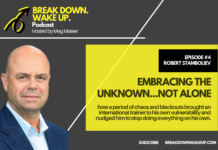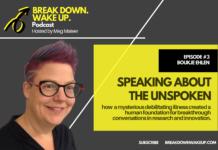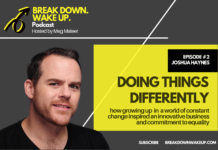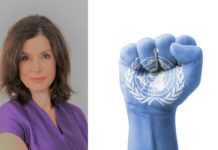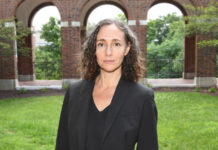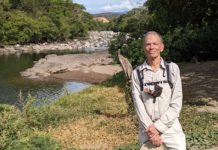Break Down. Wake Up. podcast – 006 – Creating the Context for Self Healing...
How a surprising solution to surgical complications helped a business director process her grief and embrace a new calling to help others heal themselves.
Giovanni Fava – A Different Psychiatry is Possible
In this podcast, we hear from the renowned clinician and researcher Dr. Giovanni Fava about his latest book entitled “Discontinuing Antidepressant Medications”.
Break Down. Wake Up. podcast – 005 – Breaking the Cycle of Secrecy and...
Breaking the cycle of secrecy and shame: How his own mental health recovery process helped a consulting firm partner understand his past and bring his whole self to work.
Can Critiques of Psychiatry Help us Imagine a Post-Capitalist Future? An Interview with Hans...
An interview with Hans Skott-Myhre on the seeds of post-capitalist subjectivity to be found in the writing of Franco Basaglia and R.D. Laing.
Break Down. Wake Up. podcast – 004 – Embracing the Unknown…not Alone With Robert...
How a period of chaos and blackouts brought an international trainer to his own vulnerability and nudged him to stop doing everything on his own.
Break Down. Wake Up. podcast – 003 – Speaking About the Unspoken with Boukje...
How a mysterious debilitating illness created a human foundation for breakthrough conversations in research and innovation.
New Perspectives on Eating Disorders: An Interview with Shira Collings
“Eating disorder recovery is about rejecting oppressive values.” Therapist Shira Collings discusses person-centered approaches to dealing with food-related challenges in youth.
Combatting Structural Racism and Classism in Psychiatry: An Interview with Helena Hansen
MIA interviews psychiatrist and anthropologist Helena Hansen about bringing structural competency to psychiatry while rebuilding communities.
Break Down. Wake Up. podcast – 002 – Doing Things Differently with Joshua Haynes
Joshua Haynes - How growing up in a world of constant change inspired an innovative business and commitment to equality.
Break Down. Wake Up. podcast – 001 – Practicing Inner Truth in a Polarized...
How experiencing both an abortion and motherhood inspired an approach to activism that transcends ideological divisions.
Break Down. Wake Up. podcast – Introduction
What do depression, loss, frustration, and conflict have to do with global transformation? You can find the answers in this introduction episode to the Break Down. Wake Up podcast
Why Some Experts and Patients Want to Rename Schizophrenia: Interview with Raquelle Mesholam-Gately and...
MIA interviews Matcheri Keshavan and Raquelle Mesholam-Gately on their research with service users and consumers on renaming schizophrenia.
Jim van Os and Peter Groot: When Assessing Antidepressant Withdrawal Methods, RCTs Fall Short
Jim van Os and Peter Groot discuss their paper: “Successful Use of Tapering Strips for Hyperbolic Reduction of Antidepressant Dose: A Cohort Study” published in the journal Therapeutic Advances in Psychopharmacology.
Rights Based Global Mental Health and Social Exclusion: An Interview with Ursula Read
MIA interviews the anthropologist Ursula Read about her research on mental illness, human rights, and social exclusion in Ghana.
Looking Beyond Self-Help to Understand Resilience: An Interview with Michael Ungar
Ayurdhi Dhar interviews Michael Ungar about how complex systems make us vulnerable and how resilience emerges in context-specific ways.
“Getting to the Root Causes of Suffering”: An Interview with Patricia Rush, M.D.
Dr. Rush talks about the THEN Center and the links between childhood trauma, inequality, human development, and chronic illness.
MDMA Assisted Psychotherapy and Therapeutic Humility: An Interview with Marcela Ot’alora
Richard Sears interviews Marcella Ot’alora, therapist and principal investigator for MAPS MDMA-assisted psychotherapy.
WHO and the Sea Change in Mental Health: Interview with Michelle Funk
MIA's Ana Florence interviews Michelle Funk about her leadership of the new WHO guidelines on rights-based mental health.
Discourse, Drug Use, and Psychiatry: An Interview with Critical Psychologist Ilana Mountian
Richard Sears interviews Ilana Mountian on drug use, marginalization, the disease model of addiction, and problems with prohibition.
Responsibility Without Blame in Therapeutic Communities: Interview with Philosopher Hanna Pickard
Hanna Pickard on the elusive middle ground between personal responsibility and systemic factors in our understandings of addiction.
Psychedelics, Transformative Experiences and Healing: An Interview with Katrina Michelle
Richard Sears interviews transpersonal psychologist Katrina Michelle about harm reduction practices with psychedelics in therapy.
Questioning the Moral Panic Around Teletherapy: An Interview with Hannah Zeavin
MIA's Emaline Friedman interviews Hannah Zeavin about what the history of teletherapy reveals about its limitations and radical potential.
Nutrition and Mental Health: An Interview with Julia Rucklidge, Ph.D.
Dr. Rucklidge talks about the emerging field of Nutritional Psychiatry, which looks at the relationship between nutrition and brain health and how it may affect children’s moods and behavior.
How Therapists Can Help With Psychiatric Drug Withdrawal: An Interview With Anne Guy
MIA's Richard Sears interviews psychotherapist Anne Guy about working with clients withdrawing from psychiatric drugs.
What Does Our Species Require for a Healthy Life? An Interview with Peter Sterling
In his book "What is Health," Peter Sterling asks this provocative question: What does our species require for a healthy life? And can we achieve this with drugs?

